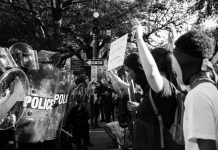Two weeks ago, a 16-year-old Palestinian Ahed Tamimi slapped an Israeli soldier when officers entered her family’s backyard. They fired tear gas at her home, breaking the windows.
Tamimi participated in protests against the Trump administration’s decision to move the U.S. Embassy to Jerusalem; protests in which her 14-year-old cousin was shot in the face with a rubber bullet and placed in a medically induced coma.
Enemy #1
Israeli television networks broadcast a clip of the confrontation. This is when Tamimi, the daughter of prominent Palestinian anti-occupation activists, became Israel’s current enemy #1.
Public figures called for her and her family to spend the rest of their lives in prison. An Israeli journalist proposed that Tamimi should be raped.
Even with the continued onslaught of attacks on her character, Tamimi stands strong. She refuses to submit to her aggressors’ abuses, and yet the Western media largely ignores her while detained in Israeli jails.
An Israeli military court will charge her for rebuking the occupation of Palestine and state-sanctioned violence against members of her family. Interrogated repeatedly without a parent or a lawyer present, she is still detained because a judge ruled that she “poses a risk” to the military and the Israeli government.
A #MeToo Moment
An article by Ariel Gold and Taylor Morley of AlterNet questions why the media largely ignores Tamimi’s story. Could this be because her feminism cannot be separated from the Palestinian cause?
Or maybe, her fight is being erased because supporting Tamimi would mean to rebuke the occupation of Palestinian lands by the Israeli state.
They write:
“Israeli logic is that Palestinians should cooperate with their own oppression. They should move quietly through the checkpoints, open their bags, not look their occupiers in the eye and certainly not challenge or protest the theft of their lands, resources, or freedoms.”
Why is no parallel drawn between Tamimi’s refusal to submit to the Israeli military and the #MeToo movement? At their roots, the movements share integral parallels. After all, the personal is political.
The same pattern that drives nation-states to invade and occupy lands, to destroy the Earth, and to suppress resistance is the same pattern imposed by abusers on victims of sexual assault.
“Ahed is revoking her consent to Israeli forces that invade her family’s home in yet another vicious, meritless night raid. She continually confronts her aggressors and stands up to the violent system of power that keeps perpetuating the cycle of abuse against Palestinians, and for that, she is threatened with sexual violence.”
“In the same way that survivors of sexual assault and rape are silenced, doubted, and blamed for the crimes committed against them, Ahed is facing the same backlash from her aggressors. Israel is working overtime to discredit and erase her voice, with the hope that people will believe their fabrications over her truth.”
The Power Of Narrative
Tamimi has been ignored because her story does not fit into the American media’s molded narrative on the Israeli-Palestinian conflict. Gold and Morley bring up Malala Yousafzai, who was propelled to international fame and won a Nobel Peace Prize after being shot in the face by the Taliban.
Yousafzai refused to step down in the face of assaults on her rights as a Pakistani woman. The difference in Tamimi’s case is that the U.S. media has yet to come to the consensus that the occupation of Palestine is wrong.
And her case is yet another signal that the situation has to change. It’s up to us to recognize and honor the intersections between resistance at home and resistance abroad. What good is a movement that selectively decides which voices are worth hearing and which fade into oblivion?
A 16-year-old girl threatens the entire structure of power in Israel. She is strong in her convictions in the face of insurmountable adversity. Will the world stand with her?
Featured Image Via YouTube Video.










